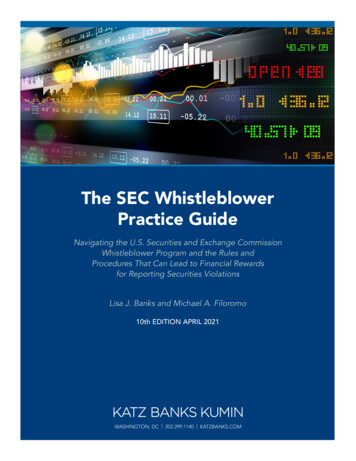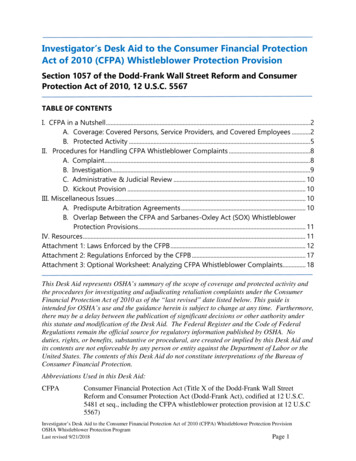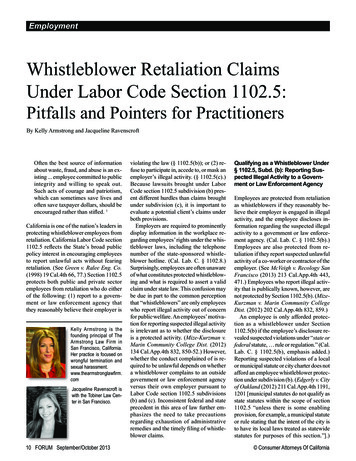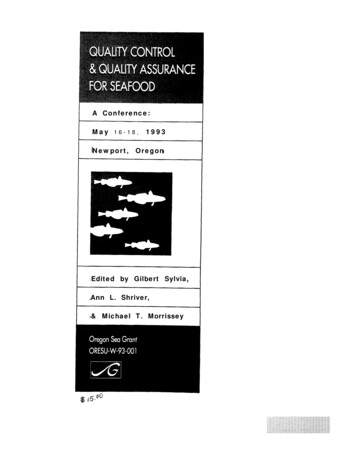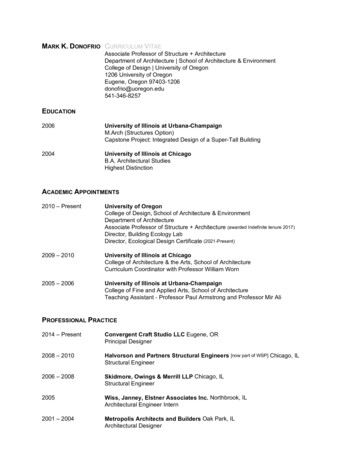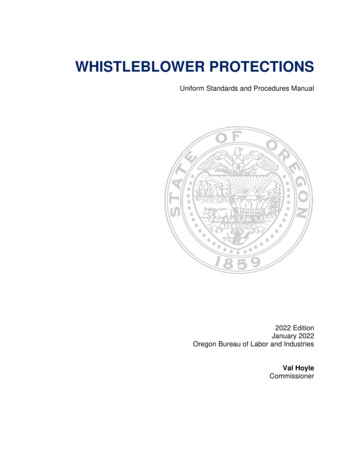
Transcription
WHISTLEBLOWER PROTECTIONSUniform Standards and Procedures Manual2022 EditionJanuary 2022Oregon Bureau of Labor and IndustriesVal HoyleCommissioner
LETTER FROM COMMISSIONER HOYLEThank you for your interest in this handbook on whistleblower protections.In 2018, Oregon expanded its whistleblowing protections so that employees can moreeasily report mismanagement, waste, fraud and abuse. Whistleblowing activity is notonly protected by law, but also a critical tool that can prompt organizations to rethinkhow they deliver services to the public. In addition, whistleblowers can help ensure thatemployers follow vital health and safety rules designed to protect co-workers andcustomers during the pandemic.The ability to report mismanagement and abuse can help improve the efficiency ofpublic agencies and non-profit organizations. Strong, proactive whistleblower protectionpolicies can foster open communication while managing risk and litigation costs.For employees, know that there are resources, such as the Civil Rights Division of theBureau of Labor and Industries (BOLI), to protect you if you’re being treated unfairlyunder the law. For employers, BOLI’s Technical Assistance for Employers Program isdedicated to helping you navigate the regulatory landscape so that you stay compliantand avoid potential problems in the first place.If employers have compliance questions not addressed in this handbook, you cancontact our employer assistance program at ta.email@boli.oregon.gov or971-361-8400. For employees who believe that you’ve been subjected to unlawfulretaliation for protected whistleblowing activities, you can contact our Civil RightsDivision at (971) 673-0764 or email us at crd.email@boli.oregon.gov.Although this handbook is not intended as legal advice, we hope that it can serve as aresource for both public and private sector organizations looking to adopt effectivesystems for encouraging greater reporting and accountability, free from unlawfulretaliation.Sincerely,Val HoyleBureau of Labor and Industriesoregon.gov/boli
TABLE OF CONTENTSWHISTLEBLOWER PROTECTIONS . 1TOP 10 THINGS TO KNOW . 1OREGON’S WHISTEBLOWER LAW: SENATE BILL 1559 AT-AGLANCE. 2DEFINITIONS . 3What is Whistleblowing? . 3Importance of Whistleblowing . 3Some Notable Retaliation and Whistleblowing Enforcement Actions. 4Opposition to Unsafe Working Conditions . 8STANDARDS AND PROCEDURES FOR ANONYMOUSWHISTLEBLOWING . 13Procedures for Disclosing Information under 659A.200, 659A.224. 13Best Practices . 13Rights and Remedies for Disclosing Information under 659A.200,659A.224 . 16Remedies . 17BOLI’s Civil Rights Complaint Process . 17State Civil Court . 20Complaining Through the Public Employer or Non-profit’s Internal GrievanceSystem . 21Appealing to the Employment Relations Board . 21Federal Protections . 21Implementation of Statutes and Rules Under 659A.200 and659A.224, Including Relevant Case Law . 23Other Notable Cases . 24OTHER RESOURCES FOR EMPLOYEES . 25CONTACTING BOLI . 26RESOURCES FOR EMPLOYERS . 27
WHISTLEBLOWER PROTECTIONSTOP 10 THINGS TO KNOW1)Public and certain non-profit employees in Oregon have the right to reportwaste, fraud and abuse or other workplace violations without fear ofretaliation.2)Retaliation can take many forms. Any adverse employment action – such astermination, demotion, reduction of hours – can represent unlawful retaliationwhen taken in response to a good faith report of a potential violation of state orfederal law.3)Private sector employees have similar protections for disclosures ofviolations of federal or state law.4)A report does not have to be substantiated for the whistleblower to beprotected from retaliation. The employee must simply have a good faith beliefwhen reporting a violation of law or unsafe working conditions.5)Employees have civil rights protections if they experience retaliation due toprotected whistleblowing activity, including filing a complaint with BOLI orsuing in circuit court. Judgments may include job reinstatement, back pay ormonetary damages.6)Public and non-profit employers are not allowed to disclose thewhistleblower’s identity during an investigation without their consent.7)All public and non-profit employers must have a written policy that describeshow employees can make protected whistleblowing disclosures.8)Effective reporting channels and protections for whistleblowers not only protectagencies from liability, but can also lead to better government performance.9)Management must protect whistleblowers from retaliation not just bysupervisors, but by co-workers as well. Employers must take correctiveaction when they determine that co-workers are retaliating against a peer forwhistleblowing activity.10) Agencies should promptly investigate reports of retaliation and work proactivelyto prevent such violations in the first place. The best practice response is tohave an independent, third party investigate whistleblower reports.1
OREGON’S WHISTEBLOWER LAW:SENATE BILL 1559 AT-A-GLANCEIn 2018, Oregon expanded its whistleblowing protection efforts for public employees byestablishing a pilot program for anonymous reporting, requiring the creation of uniformstandards and procedures for employees, and requiring biennial reports to the statelegislature.Sponsored by Senator Jackie Winters, SB 1559 earned broad, bipartisan support whensigned into law by Governor Kate Brown after the 2018 regular session of the statelegislature.The bill strengthens several existing whistleblower protections for public and non-profitemployees by requiring the following: The Oregon Health Authority, the Oregon Departments of Transportation,the Oregon Department of Human Services, and the Oregon Department ofEnvironmental Quality must create procedures for anonymous disclosurespertaining to ORS 659A.203, i.e., protected whistleblowing activity. The reportingprovision will serve as a pilot program until its sunset on January 2, 2021. BOLI shall create and make publicly available a uniform standards andprocedures manual to serve as a resource for public and non-profit employersand employees alike. BOLI must report to the governor and legislative assembly, in odd-numberedyears the number of whistleblowing disclosures as well as the number ofretaliation reports made to the four above-mentioned agencies.2
DEFINITIONSWhat is Whistleblowing?Over the years, the Oregon Legislature has expanded protections for “whistleblowers” –employees who report illegal activity by their employers. Oregon public employeewhistleblower statutes prohibit public employers from taking action against or prohibitingemployees from responding to legislative requests, disclosing information that theemployee believes is evidence of a violation of law, reporting public endangermentresulting from an action by a public employer, or disclosing evidence of waste, fraud orabuse.Importance of WhistleblowingWhistleblowing plays an important role in the health of organizations.The ability to report mismanagement and abuse is not only protected by law, but canalso help improve the efficiency of public agencies and non-profit organizations. Thinkof whistleblowing as an early warning system for outdated, ineffective or inefficientsystems that need attention.Fostering a culture of improvement can help identify and control risks and threats toyour organization. For instance, in 2013, whistleblowers revealed a widespread abuseof overtime rules at the U. S. Department of Homeland Security that was costingtaxpayers 37 million annually. In response, Congress set up a new system fordetermining overtime eligibility for border patrol agents. Recent years have also seenwhistleblowers revealing a pattern of negligence at Veterans Affairs hospitals, leading tocongressional reforms and increased funding for the Veterans Health Administration.Private sector whistleblowing can help identify financial malfeasance and corporatefraud. For instance, the Commodity Futures Trading Commission encourageswhistleblowing to help protect against manipulation of derivatives and similar financialproducts. In fact, whistleblowers are often the main line of defense in private financialinstitutions, which is why the U.S. Securities and Exchange Commission operates awhistleblower program that can award between 10 percent and 30 percent of the moneyrecovered from fraudulent activity at publicly traded companies. In fiscal year 2017, theCommission awarded 45 million to whistleblowers for reporting fraud and enabling thecollecting sanctions.Failure to protect whistleblowers comes at a cost. In the last decade, public entities inOregon have spent millions of dollars on settling lawsuits that alleged whistleblowerretaliation. Although each case is different — and settlement does not represent anadmission of an unlawful practice — civil rights claims involving retaliation andwhistleblowing have cost the state more than 4.7 million since January 2013.3
Similarly, many private companies have seen significant monetary judgments forunlawfully discharging employees that had reported wrongdoing. Each dollar spentresolving these allegations could have been better spent on organizational improvementand innovation.Setting the right tone – with clear policies and protections for employees steppingforward – can help prevent whistleblower retaliation while fostering a “speak-up” cultureof accountability.Some Notable Retaliation and Whistleblowing Enforcement ActionsIn 2016, a complainant sued the Oregon Department of Transportation after he hadbeen discharged following his internal disclosures relating to unsafe working conditionsand other violations of law. The State of Oregon settled the lawsuit for 95,000.In 2015, BOLI awarded a complainant 1,620 in back pay and 20,000 for emotionaland mental suffering. The complainant was discharged because he had reported thatBlue Gryphon, the adult foster care home that employed him, had an inadequate foodsupply for its residents. 34 BOLI 216.In 2016, a federal court awarded a former University of Oregon public safety officer 755,000 in damages and legal fees after finding that the university’s police departmentretaliated against the officer for reporting department wrongdoing. Cleavenger v.University of Oregon.In 2014, the head of Oregon Correction Enterprises sued the Department of Correctionsfor unlawful termination due to whistleblowing activity. The state settled the lawsuit for 450,000. In the same year, the state settled with the former chief administrative officerof the Employment Department, who claimed to have been terminated and retaliatedagainst for raising concerns about abuse of authority and violations of state law.In 2014, BOLI awarded two complainants 100,000 in damages for physical, emotionaland mental suffering after they were terminated by a private company, MaltbyBiocontrol, Inc., after cooperating with law enforcement, a protected activity underORS 659A.230. 33 BOLI 121.In 2006, a professor brought a lawsuit against the University of Oregon, claimingretaliation for reporting financial irregularities in a university department. As part of asettlement, the University paid the complainant 500,000.In 2005, BOLI awarded 2,400 in lost wages and 25,000 for emotional distress to acomplainant who had been discharged by Cleopatra, Inc. for reporting criminal activity .26 BOLI 125.4
In 2002, BOLI awarded 2,414 and 30,763 in back pay to complainants, and 5,000and 10,000 in damages for emotional distress. Complainants had reported perceivedcriminal activity by their employer, Hermiston Assisted Living, Inc. 23 BOLI 96.In 1997, a complainant employed as a kitchen manager, reported health code violationsto the county health department and was subsequently discharged. The commissionerawarded 1,917 in back pay and 20,000 in damages for mental suffering for theviolations of whistleblower protections. 16 BOLI 21.In 1995, a complainant reported unlawful activity by Earth Science Technology Inc., tothe Department of Environmental Quality and was discharged. BOLI awarded 20,700and 30,000 for mental suffering to the complainant. 15 BOLI 115In 1993, an Oregon court awarded 90,000 in damages to a correctional officeremployed at the Oregon State Correctional Institution, because the officer was demotedafter complaining about overcrowding in the prison.What is Retaliation?Retaliation occurs when an employer takes any adverse employment action againstan employee for making a good faith report of a violation of state or federal law, rule orregulation. Adverse employment actions can include discharge, demotion, suspensionor discrimination or retaliation in any manner against an employee with regard topromotion, compensation or other terms, conditions or privileges of employment.Employers must work to ensure that whistleblowers are kept free from retaliation fromnot only management, but co-workers as well. Employers should set clear expectationsthat retaliation is not tolerated within their organizations.Oregon law protects public and non-profit employees from retaliation for whistleblowingactivity. Under state civil rights law, public employers may not lawfully retaliate againstan employee who has disclosed information that the employee reasonably believes isevidence of a violation of any federal or state law, rule or regulation by the agency.ORS 659A.199.Anti-retaliation measures protect employees for reporting violations of state or federallaw if made in good faith (regardless of whether a subsequent investigationsubstantiates any actual violation). ORS 659A.199. Since 2009, the law has providedwhistleblowers — including both public and private sector employees — protectionwhen stepping forward to report potential violations of state or federal law, health orsafety concerns.Employers may not discriminate or retaliate against an employee who in good faithreports criminal activity, has caused a complaint to be filed, has cooperated with lawenforcement, has brought a civil action against an employer, or has testified at a civilproceeding or criminal trial. ORS 659A.230.5
Effective January 2017, Oregon law provides an affirmative defense for public and nonprofit employees facing civil or criminal charges related to the disclosure of lawfullyaccessed confidential information. ORS 659A.230.In addition, Oregon law makes it an unlawful employment practice for a coveredemployer to discharge or otherwise discipline an employee for making such a disclosureof information. ORS 659A.203. The law also requires public and non-profit employers todevelop a policy that describes an employee’s rights and remedies under the law and todistribute the policy in either written or electronic form to each employee.ORS 659A.210 (6).The 2020 Oregon Legislature amended Oregon’s whistleblower statute, ORS 659A.203,to prohibit school service employers from retaliating against school service employeesfor reporting any potential violations of any COVID-19 executive orders, laws or safetyrequirements. The law covers both public employers, but also private contractorsperforming food service, janitorial, transportation or other educational services.NOTE: Employees in the health care or residential care sectors may also bring goodfaith reports of potential violations. ORS 659A.233. Employers may not discriminate orretaliate against an employee who has, in good faith, reported a possible violation ofhealth care facility or residential care facility standards contained in ORS Chapter 441and ORS Chapter 442. According to ORS 441.057, employees reporting inappropriatecare or any other violation of law or rules shall utilize established reporting procedureswithin the health care facility first, except if they believe patient safety to be in immediatejeopardy. Similarly, the law protects nursing staff against retaliatory action by hospitals ifthe employees disclose unsafe, dangerous, or potentially dangerous care practices to amanager in written form first. ORS 441.181. If nursing staff is reasonably certain that apractice represents a crime or already known to management, they may report to aprivate accreditation organization or a public body. Employees of home health or inhome care agencies must also follow the procedures established by their employerwhen reporting violations of law or rules, except if they believe a client’s safety to be inimmediate jeopardy. ORS 443.355. Despite those specific procedures for certainemployees in the health care and residential care sector, they may also be able to relyon the general protection of the whistleblower law in ORS 659A.199 andORS 659A.203.Frequently Asked QuestionsQ: I know that Oregon law prohibits employers from retaliating againstemployees who are whistleblowers, but would it be legal for my agency toterminate or take disciplinary action against an employee who reportscriminal activity if the reporting employee was also involved in the criminalactivity? Here is my situation: Two of my employees are involved in criminalactivity in violation of our agency’s policy. After a period of time, oneemployee became uncomfortable with the activities and chose to report them.If, after investigating the allegations, the agency finds that the reporting6
employee was also originally involved in the same behavior as the other, maywe terminate the reporting employee for violating policy too?A: It’s always legal for you to follow your legitimate, non-discriminatory companypolicies and discipline employees for violations. If your agency has conducted athorough investigation and concluded sufficient evidence of criminal activity exists,you may discipline that person as you would any other employee who violated thesame policies the same number of times. If your normal policy would be toterminate a similarly situated employee, then yes, you could discharge the reportingemployee. Make sure the employee knows that the discipline was for theinvolvement in criminal activity, not reporting the activity. However, you shoulddiscuss the risk of a claim of retaliation with an attorney .As noted, Oregon law protects employees who report criminal activity, file lawsuits,cooperate with police investigations or testify in court proceedings. ORS 659A.230.Do you have sufficient documentation to show that you are basing the discharge onthe employee’s behavior and alleged criminal activity and not on the actualreporting of the other employee’s alleged misconduct? It’s always risky to terminatean employee so soon after the employee engages in some legally protected activity– in this case, whistleblowing – because the timing risks making your action appearpotentially retaliatory. The closer an adverse employment action is in time to aprotected event (reporting waste, testifying at the legislature, etc.) – known as“temporal proximity” – the more likely it is that the action will invite scrutiny andallegations of retaliation.If you had to defend against a whistleblower retaliation claim, having what’s called“comparator” evidence that supports a legitimate non-discriminatory reason for youractions is helpful. For example, are you able to show that other whistleblowersremain at the agency, dispelling the narrative that a pattern of discharging orotherwise taking adverse action against whistleblowers exists? Are you able toshow that you have also terminated other employees engaged in the sameviolations of policy? If not, you should proceed cautiously and think twice beforedischarging the employee.Q: I report to the chief financial officer and have discovered what I believe arefraudulent activities in my organization’s accounting. I am thinking of goingover my supervisor’s head to management, but I am worried about losing myjob. Would I have legal protection?A: Yes. There are both state and federal laws that provide protection to employeeswho report illegal activities. Based on the information you’ve provided, you likelyhave protection under the Oregon whistleblower statutes, and federal law couldalso potentially protect you against retaliation if you report financial fraud within yourorganization.Let’s start with the Oregon civil rights statutes, which include a general7
whistleblower law and one that applies to employees of public agencies.Oregon’s general whistleblower statute protects employees from discrimination orretaliation when they in good faith report criminal activity to any person, cooperatewith a criminal investigation, bring a civil proceeding against an employer or testifyat a civil proceeding or criminal trial. ORS 659A.230.Some courts have also granted this protection when employees report internallywhat they in good faith reasonably believe to be a criminal violation. So, you mayhave protection under this law if you make a report to management, but it woulddepend in part on your ability to explain your reason for believing that the activityrepresented a violation of law.The federal law that could give you protection as a whistleblower is the SarbanesOxley Act, enacted in the wake of corporate scandals at companies like Enron andWorldCom. The Sarbanes-Oxley Act makes it unlawful for an employer to takeadverse action against an employee who provides information or cooperates in aninvestigation related to financial fraud. The act also includes a provision for criminalpenalties for persons who interfere with an individual’s employment because ofprotected activity.Under the law, publicly traded companies must establish complaint proceduresregarding financial matters and internal accounting. Companies must allowemployees to make confidential, anonymous reports regarding questionableaccounting or auditing matters. An employee who reports what they reasonablybelieve to be a securities law violation is protected from discharge, demotion,harassment or discrimination. The protection applies not only when the employeereports a violation to Congress or a federal agency, but also when the employeereports internally to those with “authority to investigate, discover, or terminate formisconduct.”An employee who wishes to file a complaint under the Sarbanes-Oxley Act must doso within 180 days of the date of the alleged discrimination. To file, contact theOccupational Safety and Health Administration (OSHA), the division at the U.S.Department of Labor that will conduct the investigation. To prevail in whistleblowerdiscrimination claims, employees must show that they engaged in protected activity(reported a violation), that the employer knew or suspected they did so, and that theemployee suffered some adverse employment action as a result.Opposition to Unsafe Working ConditionsNo employer may terminate, discipline or discriminate against employees or prospectiveemployees because they have opposed unsafe or unhealthy working conditions. Thisprotected activity includes the right to have complained or assisted in an occupationalsafety and health proceeding under state law. ORS 654.062(5).8
Employees may file civil rights complaints with the Civil Rights Division of the Bureau ofLabor and Industries or lawsuits in court if they believe that an employer hasdiscriminated against them because they opposed safety or health hazards. Retaliationprotection extends not just to employees who have filed formal complaints, but also tothose who merely raise issues informally, including any action that puts the employer onnotice that an employee believes a health or safety problem exists.**IMPORTANT** The window in which to file a retaliation civil rights complaint withBOLI’s Civil Rights Division is shorter than the five-year deadline from the date of harmfor many other violations. Employees alleging retaliation on the basis of reportingunsafe working conditions must file a complaint with BOLI’s Civil Rights Divisionwithin one year of the date that the individual had reason to believe that an illegalaction occurred.Note: Retaliation law protections usually do not protect an employee who refuses towork, unless that refusal is based upon a reasonable belief that the employee is atimmediate risk of serious injury or death, that the employer is not willing to take action toalleviate that perceived risk, and that the refusal is limited to the specific activity thatposes the risk.Frequently Asked QuestionsQ: An employee on our maintenance team, Kurt, has raised a number of safetyconcerns about our forklifts needing basic maintenance and tune-ups. He hasalso insisted that all warehouse staff wear a mask or face covering when on thejob site. As a result, we’ve increased the number of tune-ups and directedemployees that they will face disciplinary action for not wearing proper facecoverings. Several employees resent the new safety rules, and Kurt has reportedthat they are retaliating against him, including calling him a “whiner” who “livesin fear” What is our responsibility here?A: Oregon law protects employees who oppose unsafe or unhealthy working conditions.The Oregon Safe Employment Act, in particular, makes it unlawful for an employer toretaliate or discipline an employee who raises safety concerns. ORS 654.062(5).In addition, Oregon employers must follow all COVID-19 related executive orders,including the requirement to wear a mask or face covering unless a disability preventsthe employee from doing so. By the way, Kurt would be entitled to retaliation protectioneven if you were unable to determine that his co-workers were actually harassing him.As long as Kurt or any other employee brings a safety concern to you in good faith, youhave a duty to protect the employee. Management may not allow retaliation againstsuch a worker.To avoid legal liability and risk, you should promptly investigate complaints of retaliation.Take them seriously. If you find evidence of harassment, take appropriate correctiveaction to ensure that Kurt and others are kept free from retaliation and abuse.9
The law provides broad protections from discrimination when an employee opposes anyillegal health and safety practices, makes any safety-related complaints, files a formalcomplaint with OSHA, or testifies in an OSHA investigation. “Opposition” may takenumerous forms. Employees who exercise their rights to oppose health and safetyhazards in the workplace on behalf of other employees or prospective employees arealso protected. An employee talking with another co-worker about a safety hazard thatis overheard by management would still qualify for protection against unlawfulretaliation. The same would apply with an employee writing a letter to the editor of thelocal paper regarding a protected matter.Employees may file an OSHA-related discrimination complaint with BOLI within 90 daysof the alleged discriminatory act. But hopefully, you can proactively address yourworkers’ concerns by encouraging employees to come forward when health or safetyissues arise, welcoming employee input, and assuring that your agency and Kurt’s coworkers won’t take adverse action in response.Q: What should an employer do if an employee complains of retaliation forwhistleblowing?A: The employer must undertake a prompt, thorough investigation to determine whetherevidence of retaliation exists. The employer should take detailed statements from thecomplaining person, the alleged retaliator, and any witnesses, and review and preserveany documents (such as emails, notes or letters) or physical evidence available (voicemail, surveillance video, etc.). Employers should document all steps of the investigation– including rebuttal statements obtained when there is conflict between witnesses’stories. A final report should include credibility findings whenever possible. Employersmay wish to consult an attorney for assistance with retaliation investigations. Theinvestigation should include a written plan for how investigators will conduct the inquiry.Q: May an employer also be liable for retaliation by co-workers?A: Yes, if the employer knew or should have known of the conduct, but failed to takeimmediate and appropriate corrective action, an employer may be held liable forretaliation.Q: Wha
whistleblower program that can award between 10 percent and 30 percent of the money recovered from fraudulent activity at publicly traded companies. In fiscal year 2017, the Commission awarded 45 million to whistleblowers for reporting fraud and enabling the collecting sanctions. Failure to protect whistleblowers comes at a cost.
